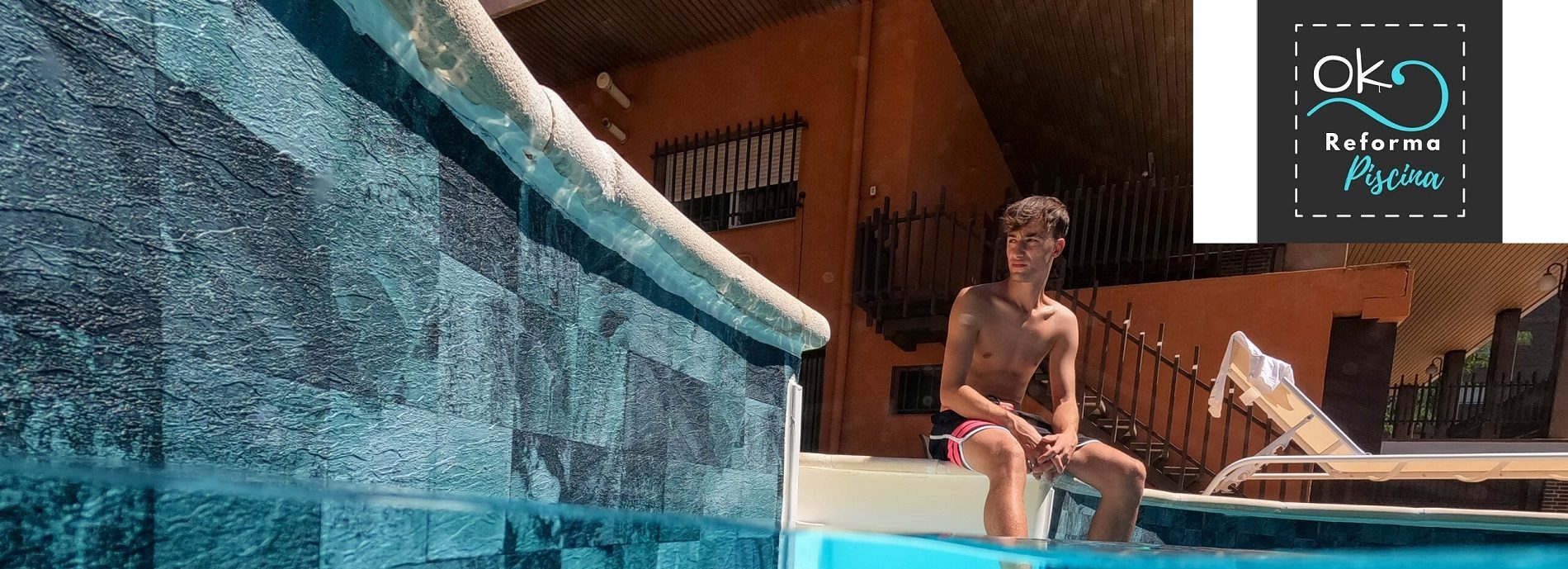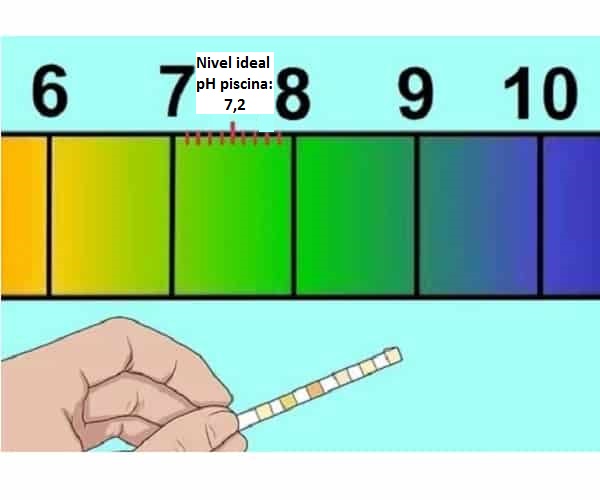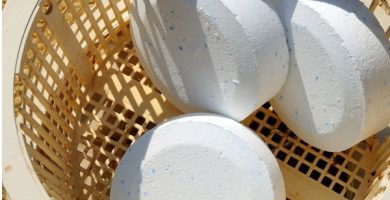
Table of contents of the page
En Ok Pool Reform and within Essential Pool Chemicals about: Chlorine lowers the pH of the pool. Actually, chlorine is the most used disinfectant in swimming pools, and also one of the most misunderstood.
What is chlorine?
Chlorine is a chemical used to clean pool water and make it safe for swimming. It works by killing bacteria and other microorganisms that can cause disease.
oxidation process
- Chlorine is a strong oxidant, meaning it destroys other chemicals. When chlorine comes into contact with organic matter in the pool, a chemical reaction occurs. Chlorine reacts with organic matter and converts it into a gas (carbon dioxide). This process is called oxidation.
- Chlorine also reacts with hydrogen ions in water to form hypochlorous acid. Hypochlorous acid is an extremely strong oxidant and will destroy any organic matter that comes into contact with it.
The ideal chlorine level on the colorimetric scale is between 1 and 1,5 ppm
How much chlorine should you add to a pool?
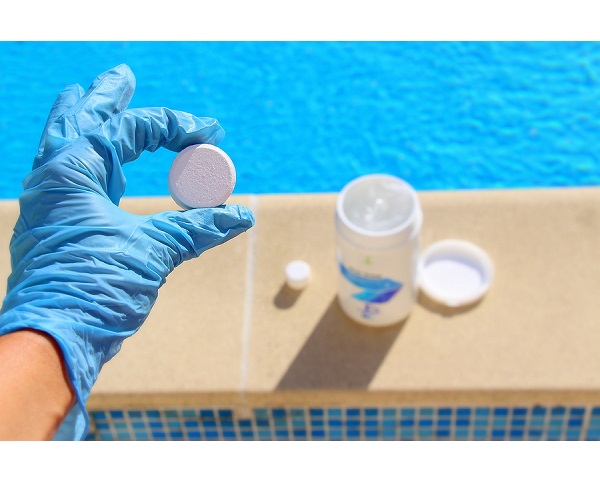
What is the level of the different values of chlorine in swimming pools?
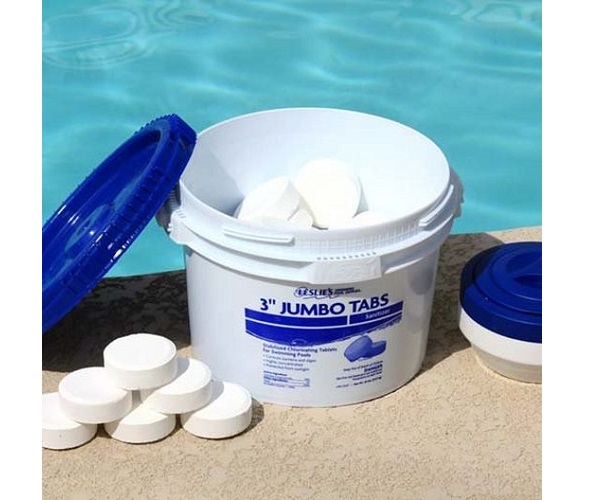
Pool chlorine level: how much chlorine does a pool need?

Ideal chlorine level in a saline pool: saltwater pools also contain chlorine
Adding chlorine to a liner pool is very important to keep the water clean and safe. However, it is important not to add too much, as this can damage the liner.
- The ideal is to add an amount of chlorine that corresponds to the pool size.
- For example, if the pool has a volume of 5.000 liters, about 50 grams of chlorine should be added. If the pool has a volume of 10.000 liters, about 100 grams of chlorine should be added.
- This ensures that the water remains clean and safe for all users.
Pool Chlorine Negative Side Effects
The main function of chlorine is to kill germs and bacteria in pools and there are many ways to add chlorine to your pool, but regardless of which method you choose, there are a few things you should keep in mind.
The main function of chlorine is to eliminate germs and bacteria in swimming pools. It does this by releasing free radicals that damage cell walls and membranes, causing them to rupture and die. Unfortunately, chlorine does not distinguish between good and bad bacteria; It literally kills any living thing in the water.
It is important to monitor pH levels and avoid adding too much chlorine at any given time.
The term pH refers to the concentration of hydrogen ions in a solution.
- It is measured on a scale from 0 to 14, in which 7 represents the neutral, 0 the most acidic and 14 the most basic (sodium hydroxide).
- The ideal pH level in a swimming pool is 7,2-7,4.
There are many different ways to add chlorine to a pool, such as using liquid or tablet forms. Regardless of which method you choose, there are some key factors to keep in mind.
An effective method to keep the pool clean is to add chlorine. However, this must be done carefully to avoid negative side effects.
- Firstly, it is important to monitor pH levels and avoid adding too much chlorine at any one time. Additionally, you should seek advice from an experienced pool professional who can guide you on how to maintain high water quality and safety.
- For this reason, it is important to monitor pH levels and ensure that you are not adding too much chlorine at any given time. Additionally, you can consult an experienced pool professional who can advise you on the best way to maintain the quality and safety of your pool water. With their guidance, you can keep your pool clean and safe for all swimmers who use it.
- You should also be careful because of the formation of harmful byproducts such as chloramines.
- So, although chlorine is effective at killing germs, it also destroys the beneficial bacteria that help keep the pool clean by breaking down organic matter into harmless compounds.
- Lastly, chlorine also lowers the pH of the water; in fact, this is its main effect on water chemistry. A high concentration of chlorine in pool water causes the pH level to drop below 7 (neutral), which can cause corrosion problems on your equipment (if you have metal parts like pipes or heaters), as well as irritation. of the skin if you bathe too frequently with high levels of chlorine in your pool.
Chlorine tablets lower the pH of the pool and increase the acidity of the water
Chlorine lowers the pH of water by dissolving in water and removing hydrogen ions (H+) and replacing them with chlorine ions (Cl-). This makes the resulting solution more basic as more chlorine ions are introduced into the water.
On the other hand, a low pH can make it difficult for chlorine to work as it should, as some of it will be consumed by reactions with other chemicals in the pool. Therefore, chlorine levels should always be balanced with pH levels before adding more chlorine to eliminate algae or other problems.
The pH of water is an important indicator of the effectiveness of chlorine. Chlorine works best when the pH is between 7,2 and 7,8. If your pool has a high pH, it means there is too much alkalinity in the water, which means less chlorine can dissolve in the water to kill bacteria.
Chlorine gas and trichlor are very acidic products, which means they have a very low pH and tend to lower the pH of the pool.
- Effects of tablet chlorine on water pH: It has the particularity of increasing the acidity of water and reducing the pH due to its trichloroisocyanuric acid composition.
- Consequences of chlorine gas is very acidic and has a pH of -1, while trichlor has a pH of -10. These products are so strong that they can drop your pool's pH significantly when added directly to the water.
- Moreover, Regarding liquid chlorine, it has another substance, in this case sodium hypochlorite. And what this does is completely the opposite: increase the pH volume of your pool water. Additionally, as we have already said, sodium hypochlorite () is also very acidic and will lower the pH of the water.
On the contrary, dichlor is more basic than trichlor, so it has less effect on the pH levels of the pool.
- Therefore, The best option is to use granulated chlorine because it is the most practical, since the chlorine level remains neutral with its use.
Alternative treatments to chlorine
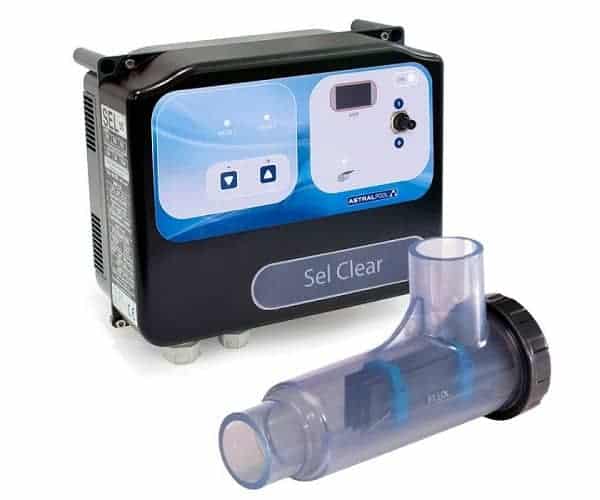
Difference between salt electrolysis (salt chlorination) and chlorine treatment

Swimming pool water treatment
Chlorine is a strong oxidant and very acidic, so it will lower the pH of the pool, so below we present some of its many alternatives:
- Chlorine-free products, such as bromine and some other halogens, tend to be less acidic than sodium hypochlorite, but still tend to lower the pH of the water.
If you have to add more chlorine than usual to maintain the bather load, there may not be enough alkalinity in the water for it to work properly.
- You can add muriatic acid o sodium bisulfate (also known as "salt") to lower the pH level of your pool if it is too high (over 7,8).
